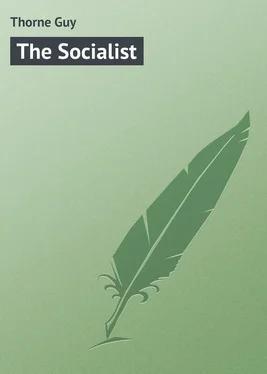Guy Thorne - The Socialist
Здесь есть возможность читать онлайн «Guy Thorne - The Socialist» — ознакомительный отрывок электронной книги совершенно бесплатно, а после прочтения отрывка купить полную версию. В некоторых случаях можно слушать аудио, скачать через торрент в формате fb2 и присутствует краткое содержание. Жанр: foreign_prose, на английском языке. Описание произведения, (предисловие) а так же отзывы посетителей доступны на портале библиотеки ЛибКат.
- Название:The Socialist
- Автор:
- Жанр:
- Год:неизвестен
- ISBN:нет данных
- Рейтинг книги:4 / 5. Голосов: 1
-
Избранное:Добавить в избранное
- Отзывы:
-
Ваша оценка:
- 80
- 1
- 2
- 3
- 4
- 5
The Socialist: краткое содержание, описание и аннотация
Предлагаем к чтению аннотацию, описание, краткое содержание или предисловие (зависит от того, что написал сам автор книги «The Socialist»). Если вы не нашли необходимую информацию о книге — напишите в комментариях, мы постараемся отыскать её.
The Socialist — читать онлайн ознакомительный отрывок
Ниже представлен текст книги, разбитый по страницам. Система сохранения места последней прочитанной страницы, позволяет с удобством читать онлайн бесплатно книгу «The Socialist», без необходимости каждый раз заново искать на чём Вы остановились. Поставьте закладку, и сможете в любой момент перейти на страницу, на которой закончили чтение.
Интервал:
Закладка:
And all the time the page-boy kept returning with the slips of paper upon which the actors and actresses had written their names upon entering, and finding out particular individuals. Some few were fortunate. "Mr. Seaton would like to see you at twelve, miss. He has something he thinks might suit you"; but by far the more usual formula was, "Mr. Seaton is very sorry, there is nothing suitable to-day; but would you mind calling again to-morrow."
At last it was Mary's turn. She was talking to a Miss Dorothy French, a girl who had been with her on the recent tour, when the boy came up to her. "Mr. Seaton is very sorry that there is nothing suitable to-day, miss; but would you mind calling again to-morrow."
Mary sighed. "I've been here for two hours," she said, "and now there is nothing after all. And, somehow or other, I felt sure I should get something to-day."
She was continuing to bewail her lot when a very singular-looking man indeed entered the room and went up to the clerk.
He was tall and dressed in loose, light tweeds, a flopping terra-cotta tie, a hat of soft felt, and a turn-down collar. His hair, beard, and moustache were a curious and unusual yellow – mustard colour, in fact. His eyes were coal black and very bright, while his face was as pale as linen.
Directly the clerk saw him he rose at once with a most deferential manner and almost ran to the agent's private room. In a second more he was back and obsequiously conducting the man with the mustard-coloured beard into the sanctum.
Mary and her friend left the office together and went out into the choking fog, which was now much lower and thicker. Both were members of the Actors Association, the club of ordinary members of their profession, and they planned to take their simple lunch there, read the Stage and the Era , and see if they could hear of anything going.
As they went down the stairs Mary said, "You saw that odd-looking man with the yellow beard – evidently some one of importance? Well, do you know, Dolly, I can't help thinking that I've seen him before somewhere. I can't remember where, but I'm almost sure of it."
The other girl started.
"What a strange thing, dear," she said. "I had exactly the same sort of feeling, but I thought it must be a mistake. I wonder who he can be?"
"He is a most unusual-looking person, though certainly distinguished – Now I remember, Dolly!"
"Where?"
"Why, at Swindon, of course, on the last week of the tour, and, if I don't forget, on the last night, too – the Saturday night. He was in evening things, in a box, with another man, a clergyman. He stayed for the first two acts, but when I came on in the third act he was gone!"
"So it was! You're quite right. Now I remember perfectly. What a curious coincidence!"
They discussed the incident for the remainder of their short walk to St. Martin's Lane, and then, lunch being imminent, and both of them very hungry, they forgot all about it.
Miss French had an appointment after lunch and went away early, leaving Mary alone. There was nobody in the clubrooms that she knew, and she sat down by a glowing fire to read the afternoon papers, fresh editions of which had just been brought in.
She read of the growing distress of the unemployed all over London. She saw that another Socialist had been elected to Parliament at a by-election – neither of which items of news interested her very much. Then she read with rather more interest, and a little shudder, that there had been a bomb explosion in Piccadilly only an hour or two ago, and that part of a great mansion belonging to the Duke of Paddington had been destroyed.
At five o'clock she went out again. The fog was worse than ever, but she knew her London well and was not afraid. She did some modest shopping, and then let herself into the house with her latch-key and went up-stairs.
Another day was over!
Another fruitless day was over, and the robin had not brought her luck after all!
As she opened her own door and felt for the little enamelled matchbox which always stood on a shelf beside it, her foot trod on something which crackled faintly.
Directly the gas was lit she saw that it was a telegram.
She opened it. It had been despatched from the Bedford Street office at two o'clock that afternoon – while she had been at the Actors' Association. It was from Seaton, the agent, and contained these words:
"Gentleman calling personally on you six to-night with important offer."
In wild excitement Mary looked at the clock. It was ten minutes to six. She lit the fire hurriedly, and urged it into flame with the bellows. Then she lit two candles on the mantlepiece to supplement the single gas jet, and drew the curtain over the window.
At six o'clock precisely she heard rapid steps, light, springy steps, coming up the stairs. There was a momentary hesitation, and then came two loud, firm knocks at her door. She opened it almost immediately, and then started in uncontrollable surprise.
The man who stood before her was the tall man with the mustard-coloured beard and the face pale as linen.
CHAPTER V
"TO INAUGURATE A REVOLUTION!"
The strange-looking man bowed.
"Miss Mary Marriott, I think!" he said.
"Yes," Mary answered. "Please come in. I have had a telegram from Mr. Seaton, the agent."
"Yes, he sent me here," said the tall man in a singularly fluid and musical voice.
"I had better tell you my name." He entered the room, closed the door, opened a silver cigarette case, and took a card from it which he handed to Mary. "There I am," he said with a smile that showed a set of gleaming white teeth and lit up the pallid face into an extraordinary vivacity.
Mary looked at the card. Then she knew who she was entertaining. On the card were these words: James Fabian Rose. The customary "Mr." was omitted, and there was no address in the corner.
Mary was a self-possessed girl enough, but she was unused to meeting famous people. She looked at the card, gave a little gasp, half of wonder and half of dismay, and then recollected herself.
"Please do sit down, Mr. Rose," she said, "and take off your overcoat – oh, and smoke, please, if you want to – I had no idea."
The tall man smiled. He seemed singularly pleased with the effect he had produced, almost childishly pleased. With a series of agile movements that had no break in them and seemed to be part of the continuous and automatic movement of a machine, he put his soft felt hat on the table, shed, rather than took off his overcoat, produced a box of wooden matches from somewhere, lit a cigarette, and sat down by the fire. He rubbed his hands together and said, "Yes, it is I, what a nice fire you've got" – all in one breath and in his rich, musical voice.
Mary sat down on the other side of the hearth, feeling rather as if she were in some fantastic dream. She said nothing, but looked at the man opposite, remembering all that she had heard of him.
About five-and-forty years of age, James Fabian Rose was one of the most noteworthy personalities of the day. He filled an immense place in the public eye, and it was almost impossible to open a newspaper without finding a paragraph or two about him on any given day. He was so well known that his whole name was seldom or never given in headlines. He was simply referred to as "J. F. R." and every one knew at once who was referred to.
His activities were enormous, and the three chief ones were Socialist leader, dramatist, and novelist. His socialistic lectures were always thronged by all classes of society. His problem plays – in which he always endeavoured to inculcate one or another of his odd but fervent beliefs – were huge successes with cultured people. His novels were only read by literary people, and then merely for their cleverness.
Читать дальшеИнтервал:
Закладка:
Похожие книги на «The Socialist»
Представляем Вашему вниманию похожие книги на «The Socialist» списком для выбора. Мы отобрали схожую по названию и смыслу литературу в надежде предоставить читателям больше вариантов отыскать новые, интересные, ещё непрочитанные произведения.
Обсуждение, отзывы о книге «The Socialist» и просто собственные мнения читателей. Оставьте ваши комментарии, напишите, что Вы думаете о произведении, его смысле или главных героях. Укажите что конкретно понравилось, а что нет, и почему Вы так считаете.












